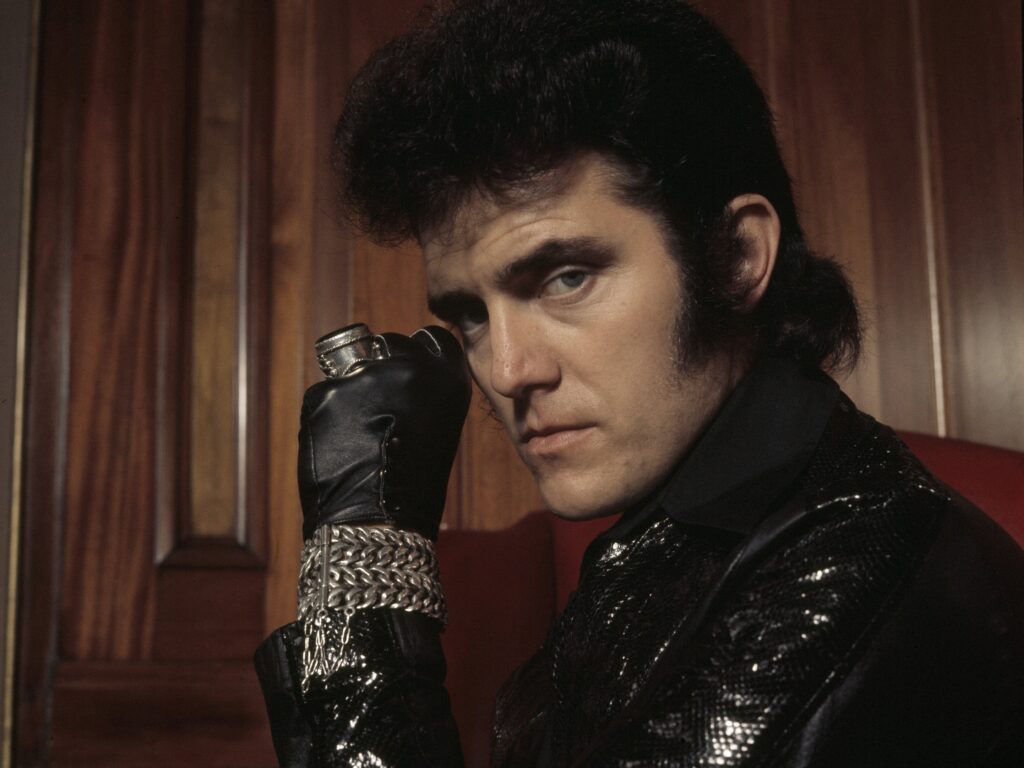
The elegant return of a rock-and-roll ghost.
It was 1981, and a new sound was dominating the airwaves. The jagged edges of punk had softened into the polished aggression of New Wave, and synthesizers were becoming a staple in every pop hit. But amidst the clamor of a rapidly changing musical landscape, a familiar face from the past made a remarkable comeback. With his signature black leather, imposing quiff, and menacing stare, Alvin Stardust re-emerged from the shadows. The song that announced his return was a stately, beautifully crafted ballad, a timeless classic given a fresh, modern sheen: “Pretend.”
This masterful reinvention was a top-tier success in the UK, a testament to the enduring power of a great song and a compelling artist. Released on the iconic Stiff Records, known for their punk and new wave rosters, “Pretend” climbed steadily up the charts, peaking at a very respectable number four on the UK Singles Chart in September 1981. For Stardust, whose glam rock glory days were a full decade in the rearview mirror, it was a stunning and unexpected triumph that proved his musical persona had far more than a single act to offer. While it did not chart in the U.S., its success in the UK cemented his status as a lasting figure in British pop music.
The story of the song itself is a fascinating one, a journey through music history. “Pretend” was not an original song by Alvin Stardust. It was a cover of a classic from the golden age of rock and roll, originally a hit for the legendary Nat King Cole in 1953. Cole’s version was a lush, romantic pop ballad, but a few years later, in 1959, rockabilly artist Carl Mann gave it a more stripped-down, rocking feel. It was Mann’s version that Stardust, a former rock-and-roller himself as Shane Fenton, drew inspiration from. He and his producer on Stiff Records took that raw energy and added a sophisticated, almost cinematic quality, with a prominent piano, sweeping strings, and a powerful, almost desperate vocal performance.
Lyrically, “Pretend” is a heart-wrenching plea, a song about the painful artifice of a fading relationship. It’s the sound of someone trying to hold on to a love that has already slipped away. The lyrics speak to a universal truth: the quiet desperation of trying to “pretend” that everything is alright, even when a deep, unshakeable distance has grown between two people. “Pretend you’re glad you’re with me / Pretend you don’t feel blue,” he sings, his voice a gravelly echo of a bygone era, now tinged with a maturity and sadness that felt both authentic and deeply personal. The song’s message resonated profoundly with an audience that had likely experienced the very same kind of heartbreak. It was a mature and emotional departure from the playful aggression of his glam rock hits like “My Coo Ca Choo” and “Jealous Mind.”
For an older generation, the song evokes more than just a memory of the charts. It is a portal back to a different time—a time when an artist could reinvent themselves and find new meaning in a classic tune. It reminds us of Alvin Stardust’s surprising journey from the glam-rock sensation to the refined crooner of the 80s. It’s a song for late nights, for quiet reflection, and for acknowledging that even in the most polished performances, there can be a deep, aching vulnerability. It proved that underneath the leather and the rock-and-roll sneer, there was a sensitive artist who could capture the bittersweet sorrow of a love that was fading, leaving only the need to “pretend” behind.